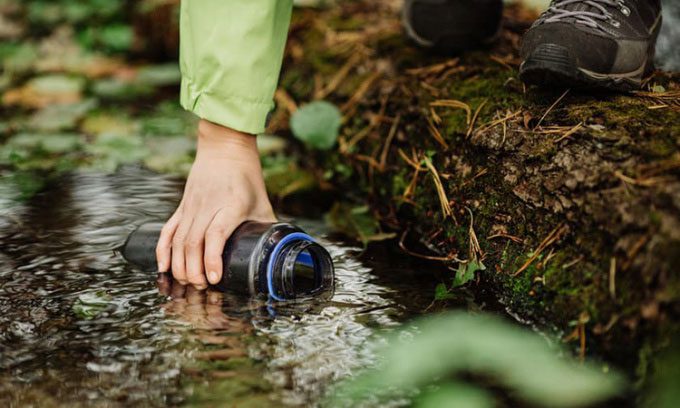In a recent experiment, a new type of powder quickly filtered a glass of 200 ml of water contaminated with approximately one million E. coli bacteria per ml.
If you place a clear water bottle under sunlight, ultraviolet rays can kill harmful bacteria inside, making the water safe to drink. However, the bottle must be exposed to sunlight for at least six hours. A team of scientists from Stanford University and the SLAC National Accelerator Laboratory developed a new powder activated by sunlight that can filter water in just 60 seconds. This research was published in the journal Nature Water on May 18.

The new water filter powder can be used by hikers needing to collect water from streams and lakes. (Image: Depositphoto)
The new powder is made from nano-sized pieces of aluminum oxide, molybdenum sulfide, iron oxide, and copper. These materials are readily available and inexpensive. Additionally, only a small amount of powder is needed to treat a relatively large volume of water.
First, a small amount of the powder needs to be stirred into dirty water contained in a clear bottle or jar, then the jar should be placed in direct sunlight. Molybdenum sulfide and copper absorb photons from the light, acting as a semiconductor that allows the photons to release electrons. These free electrons react with water, generating hydroxyl radicals and hydrogen peroxide that kill bacteria by breaking down their outer protective membranes.
Once the filtration process is complete, the remaining hydroxyl radicals and hydrogen peroxide quickly decompose into water and oxygen, making the water safe to drink. Due to the presence of iron oxide, the nano-sized particles can be recovered for reuse by dipping a magnet into the water.
In the experiment, the team added a small amount of powder to a 200 ml glass containing about one million E. coli bacteria per ml at room temperature. After placing the glass of water under natural sunlight for 60 seconds, no surviving bacteria were detected. Another advantage is that this powder can be reused up to 30 times.
The scientists hope this new technology will be applied in underdeveloped areas lacking water filtration infrastructure or used by hikers needing to collect water from streams and lakes. The new powder could even be useful in water treatment plants that currently use artificial ultraviolet light to kill bacteria.
“During the day, plants can use visible sunlight, which works much faster than ultraviolet light and also helps save energy. The nano-particles are relatively easy to manufacture and can be quickly produced in tons,” said Professor Yi Cui at Stanford University, a member of the research team.


















































